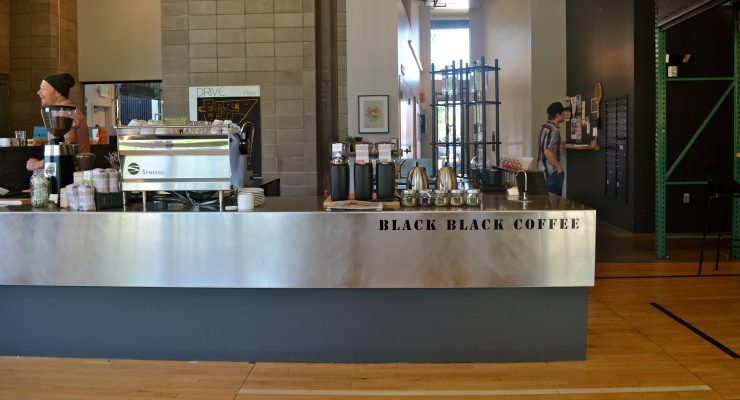
The service industry saying goes: the customer is always right. Black Black Coffee says it with a bit of a twist: If your coffee needs doctoring, it must be broken.
Owner Josh McNeilly believes in serving the best filter coffees one way, which is without cream or sugar.
“Our goal is definitely not to convert people,” says McNeilly. “It’s just basically saying like, ‘Hey, this is what’s possible with coffee.’ It’s cool if you don’t like black coffee, it’s cool if you’ve never drank a cup in your life, or if you never will. We’re not here to judge people, but we’re here to say ‘Hey, these farms and these roasters have worked incredibly hard to feature a product that we think is a little better than most coffees; and if you would be so bold as to try it.’”
Like Handsome Coffee before it, Black Black’s unconventional cafe concept and minimalistic menu may seem alienating to some. It can create somewhat of a social experiment out of enjoying coffee. Still, McNeilly is happy to offer an experience for new customers and routine for regulars.
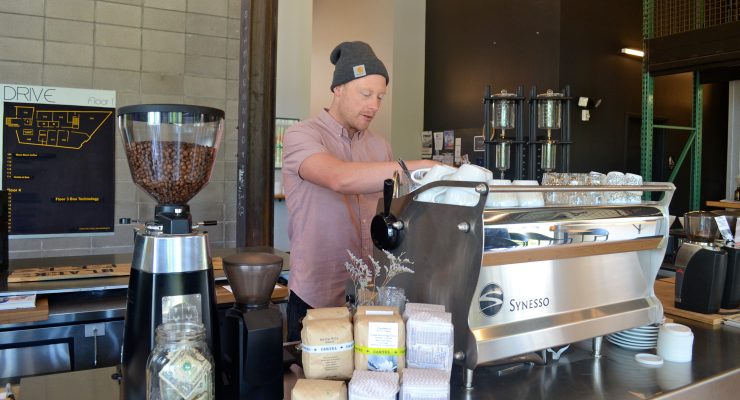
“Definitely, the majority once they try it, they appreciate it and are hooked,” says McNeilly. “Of course, there are some that don’t even try it, they’re just like, ‘Nope this shop isn’t for me. You’re a pretentious asshole, you’re a Nazi, you’re a fascist,”—all those things I’ve been called. It’s hard to do something that’s different like this without coming across as pretentious. That’s always the battle.”
Sacrificing potential customers for conviction is a price McNeilly can afford to pay. His shop resides in a repurposed school gymnasium that is a part of a multi-work and residential campus called Taxi, with many customers onsite. He believes his shop succeeds alongside the progress of the coffee industry.
“I’m passionate about serving coffee this way,” says McNeilly. “And I think the industry has grown so much over the past years that serving coffee with cream and sugar almost seems disrespectful to it.”
The cafe concept might receive eye-rolls and skepticism, but McNeilly recognizes the value in remembering everyone is allowed to be in on the joke.
“That’s the most important thing: realizing it’s just coffee,” McNeilly says. “It’s a beverage and we’re not out to make people’s day frustrating. We also want to showcase the work that farmers put in and there’s really no way to do that except to serve it the way it features best.”
Black Black’s dogma doesn’t extend, however, to the cafe’s espresso menu, which offers traditional milk drinks from macchiato to latte. The espresso bar is topped by a Synesso Hydra espresso machine and a Mazzer Kony electronic grinder. Baratza Vario-W grinders line the brew bar, with V60, Chemex, and AeroPress options available. The cafe also includes a breakfast and lunch kitchen.
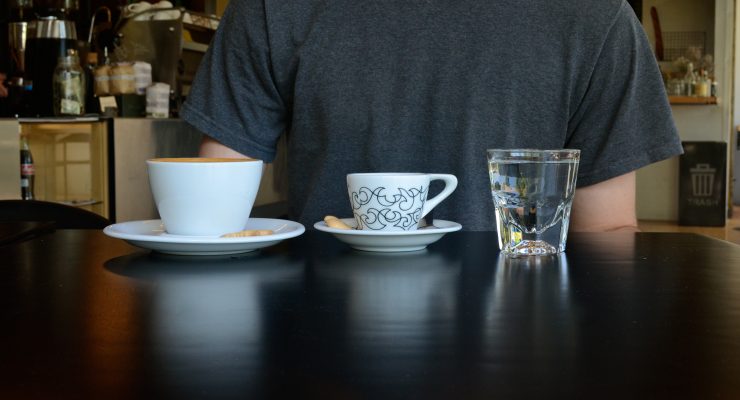
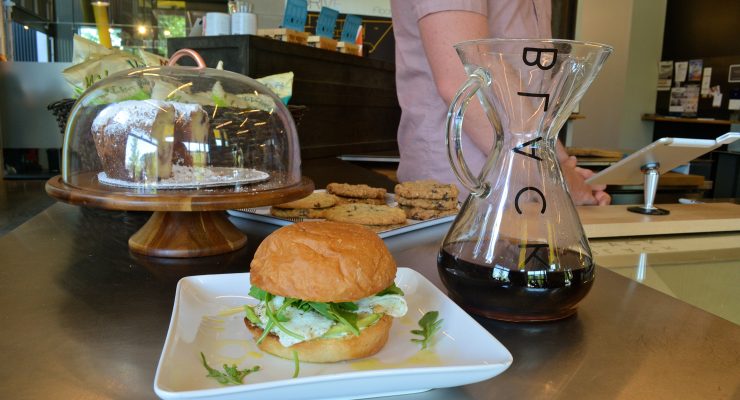
For McNeilly and the shop’s other barista, Maggie Gulasey, customer service is about shrinking the difference between what the shop is willing to offer and what the customer wants. Exclusively serving their drip coffee black is not only a conviction but also a daily exercise of customer service skills and politeness.
“Every day it’s a delicate balance,” says McNeilly. “Because you really have to know what a customer really wants before they even say it. I think there [are] two forms of great customer service: There’s offering the very best thing you can possibly offer, the best way it can be offered, or making sure the customer gets exactly what they want. And sometimes those things are different.”
Gulasey explains that kindness is key to selling the Black Black philosophy. “[We] state ‘no’ really nicely and don’t make customers feel dumb for wanting cream or sugar or asking for that,” she says. “The key is to be like ‘Yes, I totally understand…we’re trying to do something different.'”
McNeilly and Gulasey have mastered saying “no” unapologetically but nicely. The duo may direct the customers to their more flexible espresso menu should a customer become disgruntled.
“We probably tell customers ‘no’ more than any other shop out there,” says McNeilly. “But we also try not to be pretentious about it. I think you can be nice while telling someone they can’t have something, and ‘Hey, here’s why we like to do this,’ why we’re big on that, and trying not to just say ‘Nope, you can’t have that.’ We never would say that.”
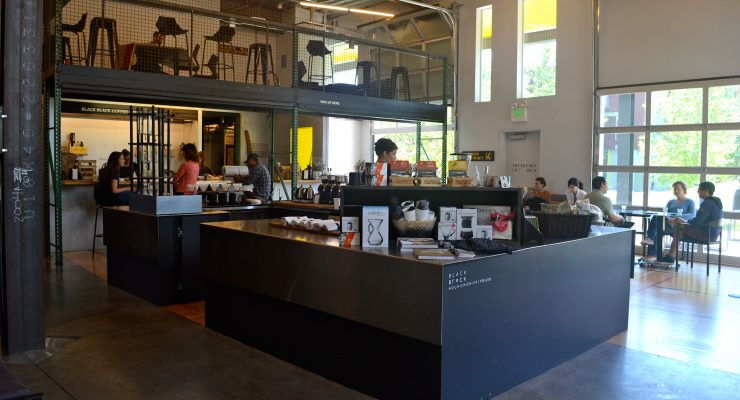
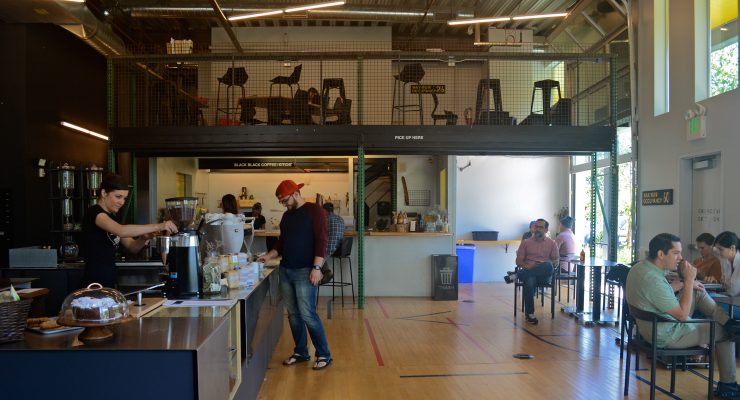
After two years, McNeilly measures success by the people happy with their experience, not the amount of cream or sugar they’ve spared from the cup.
“To see people in the morning that are regulars now, that drink our coffee and talk about it, study it, read books about it and are starting to roast—that’s awesome,” says McNeilly. “If we get like, three people that do that in our history, then perfect. That’s success.”
McNeilly’s cafe concept ultimately lands on the argument of coffee over customer. It’s unusual, interesting, and it is divisive. It is also, as he himself said, still just coffee.
Black Black Coffee is located at 3459 Ringsby Court, Denver, Colorado. Visit their official website and follow them on Facebook and Instagram.
Ben Wiese is a freelance journalist based in Denver. Read more Ben Wiese on Sprudge.
The post The Art Of No At Black Black Coffee In Denver appeared first on Sprudge.

